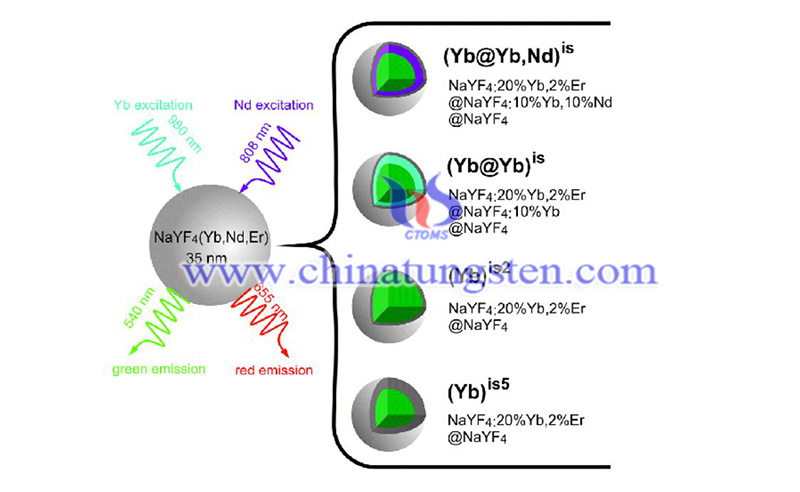China's Scientists Developed Rare Earth-Doped UCNPs
- Details
- Category: Tungsten's News
- Published on Wednesday, 06 May 2020 22:30
Rare earth-doped upconversion nanoparticles (UCNPs) have been developed by China's scientists recently, and the near-Infrared voltage nanosensors enable real-time imaging of neuronal activities in mice and zebrafish. It is the key to reveal the functional mechanism of the nervous system.
In vivo detection of group neuron activity is crucial to reveal the functional mechanism of the nervous system. The development of highly sensitive voltage probes has become one of the key technical difficulties in the current international neuroscience field. The Jiulin Du research team of the Chinese Academy of Sciences has developed a voltage-sensitive fluorescent nanosensor that can be excited by near-infrared light, and successfully monitored the dynamic changes of neuronal membrane potential in the brains of zebrafish and mice. The results were published in the Journal of the American Chemical Society.

Neuron calcium-ion fluorescence imaging is one of the main methods of in vivo imaging. However, the dynamics of calcium-ion fluorescence signals are slower than nerve impulse signals, and it is difficult to infer the frequency and number of nerve impulses corresponding to them. To achieve in vivo detection of high spatiotemporal resolution and electrical activity of large-scale neuronal clusters, the neuroscience community is eager to develop nanoparticles or molecular probes that are sensitive to changes in cell membrane potential and have high signal-to-noise ratios.
Compared with visible light or ultraviolet light, infrared light (750nm~1000nm) has stronger penetration ability in biological tissues, and the penetration depth can reach the order of centimeters. The existing fluorescent voltage probes can only be excited by ultraviolet or visible light, and because they are easily absorbed and scattered in living tissue, they can only be applied to the superficial layer of the brain.
Rare earth-doped UCNPs are a class of anti-Stokes luminescent nanomaterials excited by near-infrared light, multiple emission of ultraviolet and visible light. Due to its deep tissue penetration, low background fluorescence, and multiple emission characteristics, it has gained wide attention in the application of biological imaging and in vivo diagnosis and treatment.
The researchers designed and prepared a voltage-sensitive probe based on UCNPs. The researcher from China, Jiulin Du said, "Probes reflect changes in the membrane potential of individual neurons in the brain." According to reports, the electrical activity of neurons is rich in dynamics, and the signal-to-noise of previous fluorescent protein voltage probes is relatively low, requiring an average of multiple experiments to get a clear sensory response.
Experts say that the study provides a new way of designing voltage-sensitive probes that can be excited by near-infrared light, and opens up a new method for real-time dynamic monitoring of neural activity in deep living tissue.
"The rare earth-doped UCNPs developed by China's scientists could detect changes in various neural activities, including physiological and pathological conditions, such as epilepsy. Although nanomaterials are easy to prepare in large quantities, there is still a distance from the laboratory to widespread use. The team is dedicating on optimizing the work." Jiulin Du said.
- Rare Earth Manufacturer & Supplier, Chinatungsten Online: www.chinatungsten.com
- Tungsten News & Prices of China Tungsten Industry Association: www.ctia.com.cn
- Molybdenum News & Price: news.molybdenum.com.cn
- Tel.: 86 592 5129696; Fax: 86 592 5129797; Email: sales@chinatungsten.com



 sales@chinatungsten.com
sales@chinatungsten.com